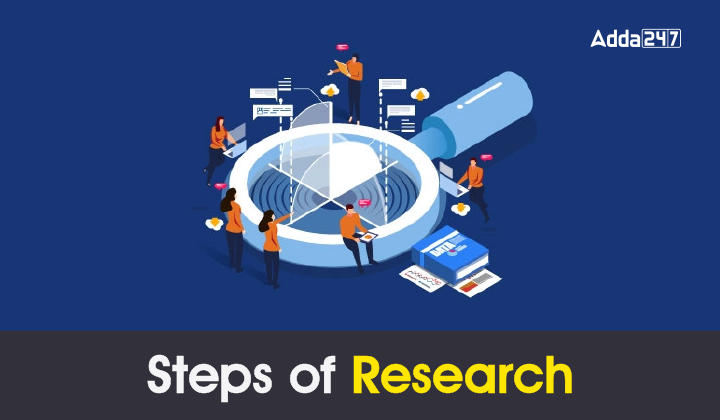Table of Contents
Research is a process involving the collection, organization, and analysis of evidence to increase understanding of a particular topic. It is defined as the creation of new knowledge and/or the use of existing knowledge in an innovative way to create new concepts and principles.
UGC NET Study Notes for Paper 1
Research Process
The research process refers to the systematic and organized approach used to gather, analyze, and interpret information to address a specific research question or objective. It involves several sequential steps that guide researchers in conducting rigorous and reliable studies.
According to Creswell, “Research is a process used to collect and analyse information to enhance our understanding of a topic or an issue.”
Steps of Research Process
There are numerous steps to be carried out during the research process, which are discussed as follows:
- Identification of the Research Problem: The first step in the research process is the identification of the research problem. It is important on the part of the researcher to have prior knowledge about the subject or the chosen topic. It starts with deciding the broader area and then moving towards the final niche topic for research. Example: Obesity in Indian youth is a problem.
- Literature Review: It refers to studying existing literature on a particular subject or theme. This is the second crucial step for upcoming steps in the research process where we review prevalent literature and develop a theoretical and conceptual framework. Example: Studying the existing studies on the topic of obesity and its related areas in order to make a better understanding of the problem.
- Research Objective: Next step in the research process is deciding the research objective that is needed to be attained throughout the whole process. These research goals generally start with the phrases like ‘to determine’, ‘to find out’ to explore, etc.
Example: Determining the reasons behind obesity in Indian youth.

- At this point, the researcher becomes clearer with the factors related to the particular research problem. These variables are called experimental variables.
- The dependent variables are those whose value is affected by the independent variables; they change with any changes in the independent variables.
- Formulation of Hypothesis: This step includes predictions about a probable relationship between the variables that have in mind for the researcher. It is just the assumption that the researcher set before the actual process of research starts. The assumption or fact that we already know is called the null hypothesis (Ho), and the one we need to test is called an Alternative hypothesis (Ha). The primary function of a hypothesis is to bring focus and clarity to the research proposal.
- Preparing the research design: at this stage, the researcher makes an outline of the whole research and answers the questions like what will be the timeline of research, what will be the methods to collect the data and also what type of data is needed to be collected. The research design is the overall plan and structure of the research.
- Data collection: This step includes determining the type of data one needs to collect and how to collect it. There are various methods of data collection. These are Probability sampling or Non-probability sampling. In probability sampling, every participant in the sampling process gets an equal chance of being selected, unlike non-probability sampling.
- Data Analysis: This step of the research is the analysis of all the data collected through different sampling techniques. A large volume of data collected is needed to be stored in the form of tables, charts or graphs. This data is then analysed using Manual data analysis and using computers. Hypothesis testing is also done here using various techniques like t-test, f-test, chi-square, ANOVA and regression etc.
- Generalisation and Interpretation: After analysing the hypothesis and data using different techniques, the researcher may arrive at the generalisation of the topic. Now, he or she prepares a theory based on all observations and develops a general idea that could be subsequently utilised in subsequent research.
- Report Writing: It is the final step of the report writing process during which the researcher writes all about the research he or she performed. This report includes the title, introduction, literature study, way of collecting data and analysis of the data along with its interpretation. The language used should be formal.
The above steps are needed to be followed during every research process. The researcher needs to be careful because a small mistake can hamper the whole results of the research.




 UGC NET Notification 2025 Out, Exam Date...
UGC NET Notification 2025 Out, Exam Date...
 Last Minute Preparation Tips for MP TET ...
Last Minute Preparation Tips for MP TET ...
 GAT B Cut Off 2025, Check Expected, Cate...
GAT B Cut Off 2025, Check Expected, Cate...














